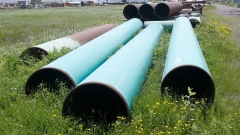Jun 12, 2023
Bill Nye 'The Science Guy' on the importance of investing in science education
, BNN Bloomberg
Bill Nye 'The Science Guy' on fostering STEM careers
Bill Nye 'The Science Guy' says young people are increasingly interested in solving the world’s environmental problems, and investments in science education are needed to help support their innovations.
“Investment in science education is in everybody’s best interest,” Nye said in a television interview.
The recognizable science educator spoke with BNN Bloomberg last week along with Milton, Ont., Grade 8 student Georgina Angelov, who won the annual ExploraVision Challenge competition – billed as the world’s largest kindergarten to Grade 12 science fair – with a group of her classmates.
Angelov’s team sought to help the planet and put a dent in pollution by growing eco-friendly fabric out of fungi.
“My group and I wanted to make something that would benefit the environment and help create a better future for the youth today,” Angelov said.
Nye said the environment is a common theme among young science innovators at the U.S.-based ExploraVision competition, where he is a spokesperson.
“People who are in school right now are very concerned about the environment. They're concerned about climate change,” Nye said from Washington, D.C. on Friday, where he noted that smoke from climate change-induced wildfires was palpable in the air.
“Many, many of these student teams are addressing problems like that.”
Nye stressed the importance of investing in science education to help encourage students to pursue STEM (science, technology, engineering, and mathematics) careers.
That begins with paying public school teachers salaries and benefits that are competitive with private sector STEM jobs, Nye argued.
“We have to make it worth it. The physics teacher at the public high school has to be paid enough money where he or she decides to pursue that instead of private industry,” Nye said. “This sounds like common sense, but it's been argued about my whole life. That’s something we can do in order to enable that sort of thinking.”
He also encouraged people to vote for political leaders who support science education.
Kathy Andrejowich, Angelov’s teacher, said it was “incredible” watching her students tackle the fungi fabrics project.
She said it can sometimes take “a little bit of convincing” to get students excited about STEM, but she is encouraged by a program at her school that allows students to build hands-on projects and code and build robots as part of their learning.
“We're hoping that as they get more experience with these items, tools, projects, that they will continue on that STEM path or in the skilled trades in the future,” Andrejowich said.
Angelov said she and her classmates hope to keep developing their mushroom fabric idea.
“We were thinking about taking the next step and figuring out how we can actually make it in real life, and just do some testing see if we can actually make this a real thing in the next 20 years,” she said.







